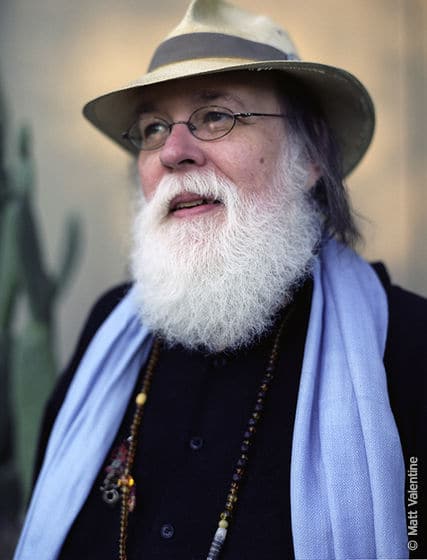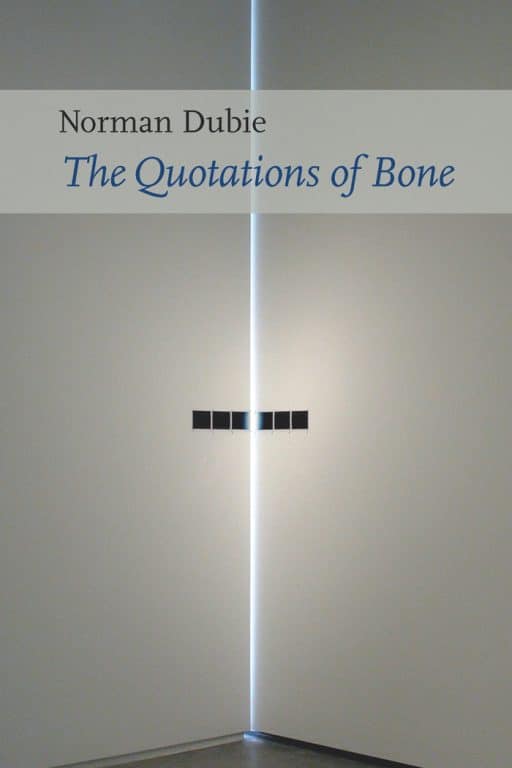
Norman Dubie is a Regents professor at Arizona State University. A practitioner of Tibetan Buddhism whose work has been translated into thirty languages, Dubie has been the poetry editor for The Iowa Review. Regularly published in The New Yorker and other magazines, Dubie is a highly regarded and widely anthologized poet. In addition to his Griffin Poetry Prize winning Quotations of Bone (2015), his other books of poetry include The Volcano (2010), The Insomniac Liar of Topo (2007), Ordinary Mornings of a Coliseum (2004), and The Mercy Seat (2001), all from Copper Canyon Press. He is the recipient of the Bess Hokin Prize from the Poetry Foundation, the PEN Center USA Literary Award for Poetry in 2002, and fellowships and grants from the Ingram Merrill Foundation, the John Simon Guggenheim Memorial Foundation, and the National Endowment for the Arts. He lives and teaches in Tempe, Arizona.

Judges’ Citation
The poems in Dubie’s newest collection are deeply oneiric, governed by vigorous leaping energy that brings the intimate into contact with history, and blurs the distinction between what is real because it once happened, and what is real because of the emphatic manner in which it has been felt.
The poems in Dubie’s newest collection are deeply oneiric, governed by vigorous leaping energy that brings the intimate into contact with history, and blurs the distinction between what is real because it once happened, and what is real because of the emphatic manner in which it has been felt. Longtime admirers of Dubie will certainly recognize the familiar mind and spirit able to punch through the surface of experience and into deep psychic quandary with a single revelatory gesture (“Did you ever want to give someone // All your money?)-but that tendency is greatly amplified here. One feels the unconscious mind working ceaselessly, even playfully, alongside memory, imparting the poems as if with a strange and consoling living spirit. This makes for a heightened sense of mystery and mortality in poems of private experience. And when such an impulse is aligned with public history-the division of Germany, say, or the acceleration of the planet’s ecological crisis-it is outright haunting. Dubie’s uncontested mastery of the lyric poem has, in this collection, broken into strange and revelatory territory.
Selected poems
by Norman Dubie
The little Blaisdale girl was knock-kneed
and cranky with freckles. She was
quiet and often immersed
in the King’s versions of holy writ.
They called her Sparrow,
so the Lord would be watchful of her …
When her father’s boat failed
to come back from the North Atlantic
there was finally a memorial
followed by a feast –
she and I were charged
to take blue enamel kettles
full of garbage
out to the pit beyond the henhouses.
She was a year older than me and could
walk faster. I stumbled
twice in the pigs’ run. It was
a cold peninsula in Maine.
It was snowing heavily …
In her old communion dress she was
now invisible in a white wind – the gulls
arriving were quickly lost
also in the storm:
there was a disembodied sobbing, only the red
carapace of lobsters, the screams of gulls
and then again,
only the armor of those big sea spiders
climbing high to a vanishing point
beyond even Butler’s Cove
and the great granite face
of Morse Mountain which like a freighter
from Asia moved impossibly into the nor’easter …
Asia was where her mother said the father
had died first,
eating even the bones of snakes, the sound
of gnashing teeth
there beside the compost heap, again and again,
with full ardor
and in the full circle of cold and nitrogen.
Copyright © 2015 by Norman Dubie
“The Sparrow”
In the cold heavy rain, through
its poor lens,
a woman
who might be a man
writes with a can of blue paint
large numbers
on the sides of beached whales –
even on the small one who is still
living, heaving
there next to its darkening mother
where the very air is a turnstile …
I’m certain this woman is moved
as anyone would be –
her disciplines,
a warranted gift to us,
to business, to government,
and our military,
and still she exhibits care and patience
this further
talent for counting,
counting …
Copyright © 2015 by Norman Dubie
For Tranströmer
An ars poetica
I remember the death, in Russia,
of postage stamps
like immense museum masterpieces
patchwork
wrapped in linen, tea stained,
with hemp for strapping…
these colored stamps designed for foreign places
were even printed during famine—
so when they vanished, so did the whole
Soviet system:
the Berlin Wall, tanks from Afghanistan,
and Ceausescu’s bride before a firing squad.
It had begun with the character of Yuri Zhivago
in a frozen wilderness, the summer house
of his dead in-laws, his
pregnant mistress asleep
before the fireplace
with flames dancing around a broken chair, piano keys,
and the gardener’s long black underwear.
Lara lying there. A vulgar fat businessman
coming by sleigh to collect her for the dangers
of a near arctic escape…
But for Yuri, not that long ago, he was
with celebrity,
a young doctor publishing a thin volume
of poems in France, he was writing
now at a cold desk
poems against all experience
and for love of a woman buried
in moth-eaten furs on the floor—
while he wrote
wolves out along the green tree line
howled at him. The author of this novel,
Boris Pasternak, arranged it all. Stalin would
have liked to have killed him. But superstition kept him from it.
So, the daughter of Pasternak’s mistress eventually
is walking with a candle
through a prison basement—
she is stepping over acres of twisted corpses
hoping to locate her vanished mother …
she thinks this reminds her of edging slowly
over the crust on a very deep snow, just a child who believes
she is about to be swallowed by the purity of it all,
like this write your new poems.
Copyright © 2015 by Norman Dubie